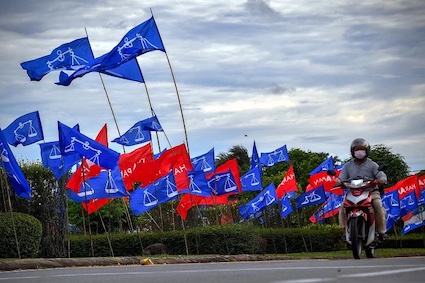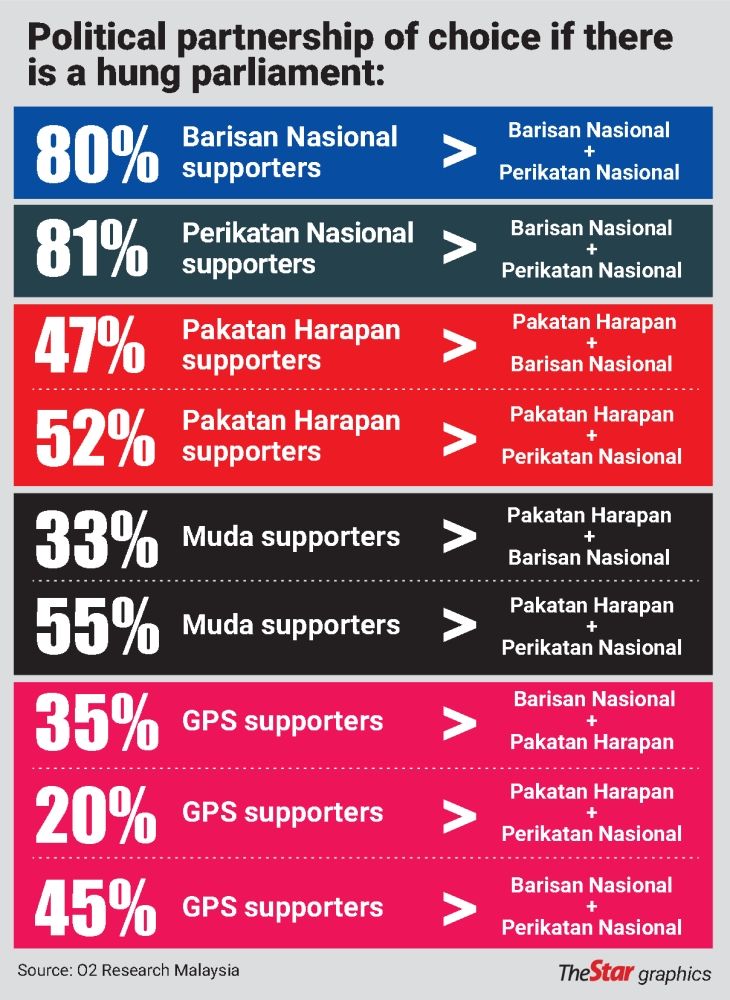Will Malaysia see a hung parliament and unity government?

It is likely that none of the major groups will get a majority, so they will need to form pacts.
Wong Chun Wai, The Star
WITH barely a week to go before Malaysians hit the polls, the preliminary assessment is that the results will likely not be conclusive.
It means the three main coalitions, Barisan Nasional, Pakatan Harapan and Perikatan Nasional, may not have enough seats individually to form the next federal government.
A minimum of 112 would be a simple majority in the 222 seat Dewan Rakyat, but one or two coalitions will still need support from Sabah and Sarawak.

The Gabungan Parti Sarawak (GPS) comprising Parti Pesaka Bumiputera Bersatu (PBB), Sarawak United People’s Party (SUPP), Parti Rakyat Sarawak and Progressive Democratic Party, is poised to be kingmaker.
It vies winning at least 26 of the 31 parliamentary seats at stake. In the 2018 elections, it won 19 of the 31, but the optimism this time is fuelled by the results of last year’s state elections, in which the coalition won 75 of the 82 state seats.
In Sabah, while Barisan and Perikatan are slugging it out at the federal level, leaders of the two coalitions are still working together at the state government level.
Sabah has 25 parliamentary seats with Gabungan Rakyat Sabah (GRS) contesting in 13 seats. The GRS comprises Bersatu, Parti Bersatu Sabah, Sabah STAR, Sabah Progressive Party and Usno.
The Sabah Barisan is made up of Umno, Parti Bersatu Rakyat Sabah, MCA and MIC. It’s contesting in 12 seats while Warisan is trying in all 25 seats, with the possibility of winning four to eight.
But in the event of a fragmented GE15 outcome, what do the supporters of the various coalitions favour?
A survey by 02 Research Malaysia revealed that among Barisan supporters, an overwhelming 80% want Barisan to partner with Perikatan.
An almost equal number was reflected by Perikatan supporters, with 81 % choosing the same coalition.
Among GPS voters, 45% preferred Barisan and Perikatan to form the federal government while 35% picked Barisan and Pakatan and 20% chose Perikatan and Pakatan.
For Pakatan backers, 52% favoured Perikatan and Pakatan while 47% opted for Barisan and Pakatan.
Among supporters of Muda, 55% insisted on a Perikatan and Pakatan government with 33% picking Barisan and Pakatan.
Interestingly, the survey, which was conducted until Oct 10, found that among Malay bumiputras, 68.7% wanted Umno and PAS to work together with 19.8% against and 11.5% neutral.
Among non-bumiputras, the survey revealed that 73.3% wanted Pakatan to work with other opposition parties with 14.5% against and 12.2% neutral.
But among politicians, it’s no secret that signals have been sent, and even top DAP leaders including secretary-general Anthony Loke, have not ruled out working with Umno.
The DAP bargaining power is that it can deliver a sizable number of seats, mostly from the predominantly Chinese areas.
In August, Loke was quoted as saying that “such matters could happen as anything is possible in politics.”
At least two high-level Umno leaders have told the media in closed-door discussions that they are open to working together and revealed the deal on the table – including the red lines.
Well, it won’t be anything new since in 1969, the then opposition Gerakan, which captured the Penang state government from the Alliance, eventually joined Barisan. The Alliance comprised Umno, MCA and MIC.
Thickening the plot, Pakatan chief Datuk Seri Anwar Ibrahim has had to refute talk of a pact between him and Barisan chairman Datuk Seri Dr Ahmad Zahid Hamidi. Ahmad Zahid was Anwar’s long-time political secretary when the latter was in Umno.
Tun Dr Mahathir Mohamad has continuously made that claim, saying he had information of the discussion between Anwar and Zahid.
While the attention of most political analysts has been on the west coast of the peninsula, particularly Pakatan, the battle of the Malay heartland in the east coast is the most crucial determinant.
Pakatan has not been able to break into the Malay areas where PAS is crucial in locking in the votes for Bersatu, the main Perikatan party, making it a serious player. But in the end, the fate of these three coalitions depends on whom Sarawak and Sabah decide to partner.
Rightly and deservingly so too, as Malaysia isn’t just made up of the states in the peninsula.
So, will Malaysians be left with a unity government after the votes have been counted on Nov 19?

